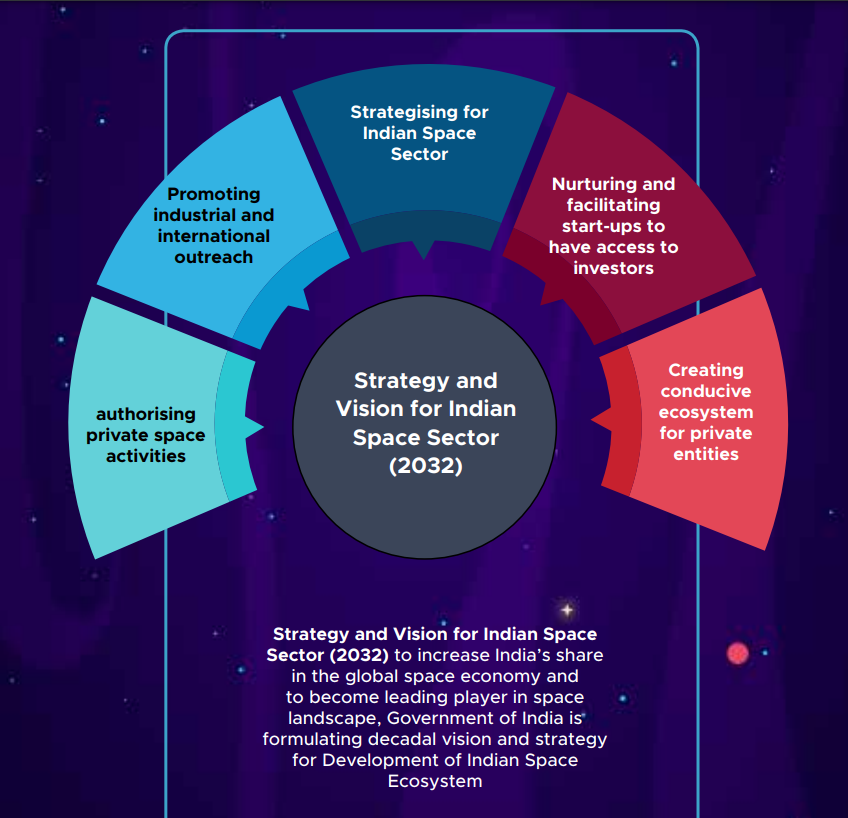Indian Economy
Eased FDI Policy for Space Sector
- 27 Feb 2024
- 7 min read
For Prelims: Foreign Direct Investment, Indian Space Policy 2023, Aditya L1. Chandrayaan-3, Mars Orbiter Mission, Indian National Space Promotion and Authorisation Centre, Recent Trends Related to FDI
For Mains: Key Amendments in FDI Policy Related to the Space Sector, FDI Prohibited Sectors in India
Recently, the Union Cabinet approved amendments in the Foreign Direct Investment (FDI) policy pertaining to the space industry.
- This development comes in alignment with the Indian Space Policy 2023, which seeks to unlock the nation's potential in the space domain through enhanced private participation.
What are the Recent Amendments in FDI Policy for the Space Sector?
- 100% FDI Allowed: Under the amended policy, 100% FDI is permitted in the space sector, aiming to attract potential investors to Indian space companies.
- Liberalised Entry Routes: The entry routes for various space activities are as follows:
- Up to 74% under Automatic Route: Satellites-Manufacturing & Operation, Satellite Data Products, Ground Segment & User Segment.
- Beyond 74%, the government route applies.
- Up to 49% under Automatic Route: Launch Vehicles, associated systems or subsystems, Creation of Spaceports.
- Beyond 49%, the government route applies.
- Up to 100% under Automatic Route: Manufacturing of components and systems/sub-systems for satellites, ground segment, and user segment.
- Up to 74% under Automatic Route: Satellites-Manufacturing & Operation, Satellite Data Products, Ground Segment & User Segment.
What are the Major Developments in the Space Sector in India?
- About:
- India constitutes 2-3% of the global space economy (US: 40%, UK: 7%) and is expected to enhance its share to more than 10% by 2030.
- ISRO is one of the six largest space agencies in the world.
- India constitutes 2-3% of the global space economy (US: 40%, UK: 7%) and is expected to enhance its share to more than 10% by 2030.
- Recent Major Successful Missions:
- Advancements in Launch Vehicles:
- Missions for International Clients
- Other Key Developments:
What are the Key Features of Indian Space Policy 2023?
- Transition of ISRO's Role: ISRO to transition out from manufacturing operational space systems and concentrate on research and development in advanced technologies.
- Private Participation Encouragement:
- Non-government entities (NGEs) permitted to offer national and international space-based communication services through self-owned, procured, or leased satellite systems.
- NGEs encouraged to manufacture and operate space transportation systems, including launch vehicles, shuttles, and develop reusable, recoverable, and reconfigurable technologies and systems for space transportation.
- NGEs permitted to engage in the commercial recovery of asteroid resources or space resources.
- Entitled to possess, own, transport, use, and sell obtained resources in accordance with applicable laws.
- Industry Collaboration and Commercialisation: Indian National Space Promotion and Authorisation Centre (IN-SPACe) mandated to promote, handhold, guide, and authorise space activities autonomously.
- NewSpace India Limited (NSIL) is tasked with commercialising space technologies and platforms, manufacturing, leasing, or procuring space components, and servicing space-based needs on commercial principles.
What is Foreign Direct Investment?
- About: FDI is an investment made by a foreign entity into a business or corporation in another country.
- FDI can be in the form of equity instruments, or it can be a controlling ownership stake in a business.
- FDI in India:
- In India, FDI is defined as an investment made by a person who is not a resident of India. This can be in the form of:
- An investment in an unlisted Indian company
- An investment in 10% or more of the post-issue paid-up equity capital of a listed Indian company.
- Total FDI inflows in India in FY 22-23 is USD 70.97 billion.
- According to the Reserve Bank of India, The United States was the largest source of FDI in India in 2022-23.
- It was followed by Mauritius, the United Kingdom and Singapore.
- In India, FDI is defined as an investment made by a person who is not a resident of India. This can be in the form of:
- Also, during 2022-23, market value of FDI in India increased by 6.9% in rupee terms, primarily due to the rise in FDI in unlisted companies.
- Routes of FDI in India:
- Automatic Route: Under the Automatic Route, the non-resident investor or the Indian company does not require any approval from the Government of India for the investment.
- Government Route: Prior to investment, approval from the Government of India is required.
- Proposals for FDI under this route are considered by the respective Administrative Ministry/ Department.
- FDI Prohibited Sectors in India:
- Gambling and Betting
- Chit Funds
- Nidhi Company
- Trading in Transferable Development Rights (TDR)
- Real Estate Business
- Manufacturing of Tobacco Products
- Sectors Not Open to Private Sector Investment: Includes atomic energy and railway operations (except for permitted activities under the Consolidated FDI policy).
- Lottery Business: Including government or private lotteries, and online lotteries.
UPSC Civil Services Examination, Previous Year Questions (PYQs)
Prelims:
Q. Consider the following: (2021)
- Foreign currency convertible bonds
- Foreign institutional investment with certain conditions
- Global depository receipts
- Non-resident external deposits
Which of the above can be included in Foreign Direct Investments?
(a) 1, 2 and 3
(b) 3 only
(c) 2 and 4
(d) 1 and 4
Ans: (a)
Mains:
Q. What is India’s plan to have its own space station and how will it benefit our space programme? (2019)
Q. Discuss India’s achievements in the field of Space Science and Technology. How the application of this technology helped India in its socio-economic development? (2016)







